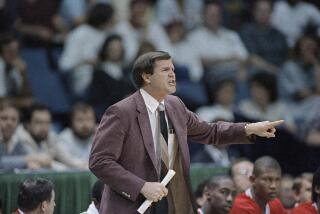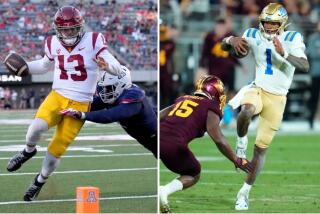A Black Coach in Bluegrass
- Share via
LEXINGTON, Ky. — On the campus of the University of Kentucky, signs of legendary basketball coach Adolph Rupp are everywhere, from the bronze plaque outside Memorial Coliseum that calls Rupp the “Baron of the Bluegrass” to the 23,000-seat arena named after him a few miles down the road.
But in some places things have changed, such as the new basketball office that was built after Rupp retired in 1972. And there’s the person who, as of last week, inhabits that office: Orlando “Tubby” Smith, 45, who is trying to carve out a niche of his own.
As if coaching at one of the more successful college programs in history weren’t difficult enough, Smith has found his job made all the more pressure-packed because he is the first black coach of Kentucky’s men’s team.
Not lost on Kentucky followers is the fact that in 1966 Rupp’s all-white team lost to a Texas Western team that started five black players in the championship game of the NCAA tournament in College Park, Md., a game that has come to symbolize the era of segregation in college sports.
Now, feelings from that era have been rekindled. A local newspaper columnist who is black wrote in an open letter to Smith that he should stay at Georgia and not take the Kentucky job, because Wildcats fans are not ready for a black coach.
Rupp’s son, Adolph Jr., and other Rupp associates have said that Adolph Sr., who died in 1977, is a victim of revisionist history, that he was not a racist but merely a product of his time.
Through it all, Smith, who worked as an assistant coach from 1989 to ’91 under his Kentucky predecessor, Rick Pitino, has tried to smooth over any rough feelings.
“Whenever a black coach gets a head coaching job at a major university and it’s a first, it’s always going to be kind of unique,” Smith said during a recent news conference at the Wildcat Lodge. “After a while that wears off, and people look at you as a coach, that’s it. What have you done for me lately? Have you won the big one?
“I felt very comfortable coming back here. I think I’d feel that way no matter what color I am. I do relate a lot with the people around the state. My upbringing is closely associated with them, coming from a rural southern Maryland area.”
The new job reportedly will pay him $1 million a year for five years.
The players Smith inherited from Pitino, who left to coach the NBA’s Boston Celtics after his Kentucky teams won the 1996 national championship and finished second this year, say they believe too much has been made of Smith’s race.
“Much too much,” said senior guard Cameron Mills, who is white. “It’s ridiculous what’s going on in the media about it. I’m not going to sit here and be naive that there aren’t going to be people who are wondering why we’re hiring a black basketball coach. But it’s sad. This guy was not hired because he was black. He was hired because he’s the best man for the job.”
Junior center Nazr Mohammed, who is black, said, “I never thought about a black or white coach. A coach is a coach. It’s all about how well they can coach, not their color. . . . I feel the community loves Kentucky basketball so much, they’re going to support us regardless of the race of the coach.”
If Smith already is working to smooth relations in the state, perhaps he learned such diplomacy growing up in Scotland, Md., as the sixth of 17 children born to Parthenia, 72, and Guffrie Smith Sr., 75.
The winner of a Purple Heart as a machine-gunner in World War II, Guffrie was raised by his uncle, James Holley, who was a sharecropper. After the war, Guffrie worked as a tenant farmer, barber and school-bus driver. He did the driving job daily for 49 years until he was slowed by quintuple-bypass heart surgery two years ago.
“My dad, his whole thing was longevity,” Smith said. “You’ve got to last and work hard every day like you’re going to be here forever.”
Tubby earned his nickname because he often refused to leave his grandmother’s wash-bin. He earned his reputation as a great athlete by scoring 1,000 points in three seasons at Great Mills High School, where he was in one of the first few classes to integrate in 1967. His brother, Odell, 43 and a math teacher at Great Mills, said Tubby’s athletic prowess helped unite the school during a difficult transition.
“The first few years of integration, there was pretty much overt racism,” Odell said. “There were a lot of good ol’ boys who pretty much dominated the school before blacks were here. When Tubby got here with his athleticism, they were pretty surprised, to say the least.”
Tubby Smith played four years at High Point (N.C.) College, where he married his wife, Donna, who was the first black homecoming queen. After coaching stints at Great Mills and another high school, Smith was hired as an assistant by one of his college coaches, J.D. Barnett, who was then Virginia Commonwealth’s coach.
Smith learned so well that when he earned his first head job at Tulsa in 1991, he replaced Barnett, who had been fired. In four seasons, Smith led Tulsa to two appearances in the NCAA tournament’s round of 16.
From Tulsa, Smith jumped to Georgia in 1995. In two seasons, his teams went 45-19 and made the NCAA tournament both seasons, advancing to the Sweet 16 in 1996.
He taught a combination style he had learned under Pitino, who favors an up-tempo game and a full-court pressing defense, and Barnett, who prefers a stifling half-court defense.
Smith’s arrival here prompted Merlene Davis of the Lexington Herald-Leader to write that “Kentucky fans aren’t ready for a black head coach. . . . I sincerely fear for your safety.”
Rupp, who was the winningest all-time coach (876-190) before being surpassed by North Carolina’s Dean Smith this past season, did not successfully recruit a black player until Tom Payne in 1969.
Kentucky’s sports-information staff is quick to remind people that Rupp offered a scholarship to Wes Unseld in 1964 and Butch Beard in 1965, but that those two, who are black, chose to attend cross-state rival Louisville.
Adolph Rupp Jr., who works as a farmer here and is known as “Herky,” attended the news conference the day Smith was hired and said his father would have shook Smith’s hand and welcomed him.
Rupp’s supporters say the former coach is being unfairly held up to today’s societal expectations rather than the ones in place in the mid-1960s, when most teams were just beginning to integrate.
“It’s become a stereotyped thing,” said equipment manager Bill Keightley, 70, who has worked with the basketball program since 1962. “It’s just the way it was. There was turbulence all over the country over the Vietnam War and what have you. It’s just a fact that’s accepted that never existed. . . . Sometimes you’re a victim of your time, and you’re classified by your time.”
More to Read
Go beyond the scoreboard
Get the latest on L.A.'s teams in the daily Sports Report newsletter.
You may occasionally receive promotional content from the Los Angeles Times.










